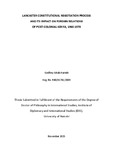| dc.description.abstract | Kenya‘s independence constitution of 1963 was a negotiated document that was expected to provide a framework capable of embodying the interests of all groups in a sustainable manner. These groups had emerged on racial lines and were involved in racial tensions pitting on the one hand Africans who had been forcibly dispossessed of their lands and displaced, and on the other the white settlers who had a mission of turning Kenya into a ―white man‘s country‖. Between them were the Asian immigrants who dominated the fields of commerce and professional services, and who sought racial parity in governance. The tensions intensified when the British government declared its intension to grant independence under majority rule. Independence implied that a new constitutional dispensation had to be negotiated between the British government, the declining settler-based colonial order, and the African nationalists. Negotiations took place in a series of conferences that were held in Lancaster House, London, and at Government House, Nairobi, in 1960, 1962 and 1963. At the end of the negotiation process, a constitution was promulgated that was expected to provide an effective instrument of governance in the new independent nation | en_US |

